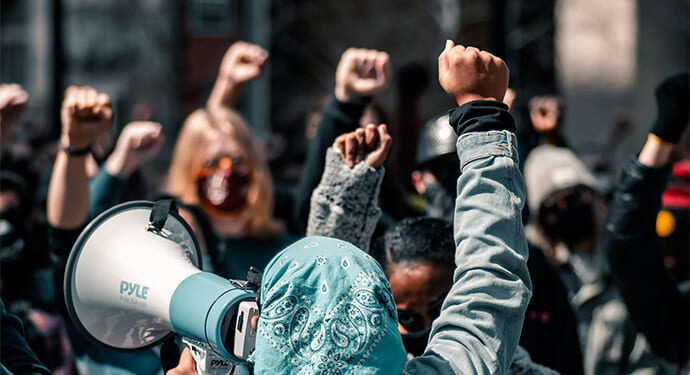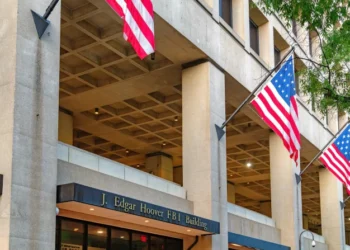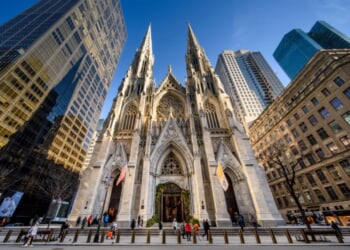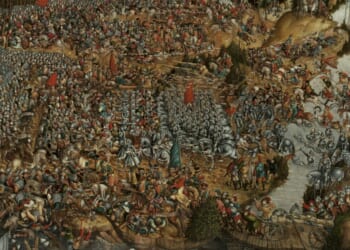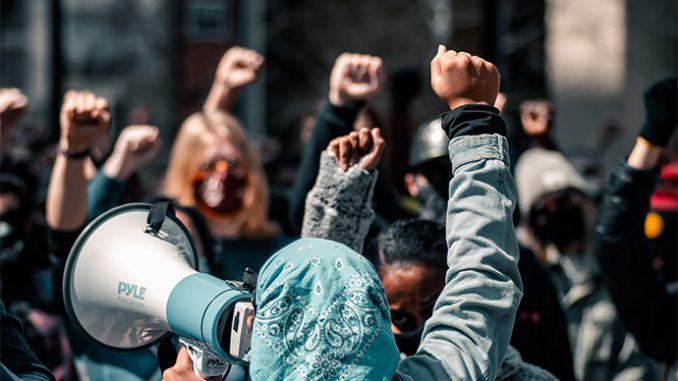
Modern politics go to extremes.
There are a variety of reasons for that. One is that modern thought likes to draw far-reaching conclusions from a few simple principles. In the natural sciences, where exact verification is possible, it has been extremely productive.
In politics, it leads to insanity.
That’s what has happened to liberalism. It once seemed moderate, practical, and reform-minded. Its belief in the rule of law and constitutional protections for individual rights seemed part of that. But the logic of those principles said otherwise. Liberal rights famously evolve, and they trump practical considerations, so the liberal right to equal freedom eventually comes to require the eradication of all traditionally accepted human distinctions.
The result is that liberal rationality has gone insane, and liberalism itself has become extreme and illiberal.
The Great Awokening, which began in earnest a decade or so ago and reached its peak in 2020, was the collapse of liberal moderation in favor of the progressive radicalism that now dominates respectable opinion. The latter has softened a bit, at least temporarily, but the former seems unlikely to return. Basic liberal commitments leave no principled case to make against radicalism. “You’re right, but you’re in too much of a hurry” is not a winning political slogan in the face of what have come to be considered the demands of basic justice and decency.
But is Catholic political thought different? Does it also go to extremes, at least when it can? Influential people think so. Are they right?
Standards of extremism vary. Rejection of transgenderism is commonly considered extreme today. And even people who are willing to concede some legitimacy to that position are likely to consider those who think there are differences between the sexes that sometimes give men a legitimate advantage—for example, in the military—to be simply bigots.
Others, of course, believe that today’s progressive views demonstrate deep deficiencies in public thought. Sexual differences go back to Adam and Eve, and perhaps hundreds of millions of years before that. What sense, they ask, does it make to consider them a human construction with no special significance?
Such disputes are notoriously difficult to decide in a way that seems rational to both sides. We should nonetheless make the attempt.
Concepts such as God, sin, and “no salvation outside the Church” certainly have extreme aspects. And the saints are known for doing extreme things. If Catholic social and political views follow from basic Catholic beliefs, as they should, it seems they would have extreme aspects as well.
But there are other considerations. One is the Christian injunction to respect the powers that be. That injunction has been ingrained among Catholics to a degree some have found excessive, as with the 1933 Reichskonkordat with Germany and the current Vatican deal with China. So it has sometimes led to a degree of cooperation with extremist regimes, to the extent needed to secure permission for the Church to operate. Even so, it leaves little room for the Church to pursue its own forms of political extremism.
Another is that Catholic thought insists on the human tendency to make a mess of things, and the acute need for each of us to guard against that tendency. An implication of that insistence is an emphasis on caution in practical affairs, including politics.
Still another consideration is the emphasis on the authority of the hierarchy, which values its independence from secular powers, and whose training and concerns differ radically from those of politicians and secular officials. These qualities favor a generally arm’s-length approach to practical politics. In addition, the Catholic hierarchy runs a very large and very ancient organization, so its members have personal as well as long institutional experience of the practical difficulties of governing. That experience inculcates realism.
The most basic consideration, perhaps, is that Catholicism is not fundamentally about politics, and does not put its hope there. Some very influential people in the Church have been trying to change that in recent decades: consider, for example, the pronouncements of the Synod on Synodality, which seem to make the Faith mostly a matter of promoting solutions to global social problems, as defined from a progressive perspective.
But this politicizing tendency is likely to be transitory, and is not truly radical in any event. Whatever may have been true decades ago, the people now attached to such projects are mostly aging religious professionals who are more interested in their careers and the memories of their youth than radical social transformation. As such, their “radicalism” is likely to consist mostly of verbal support for progressive initiatives such as unrestricted migration that are already being pushed by powerful mainstream institutions.
That situation is unlikely to change. Ordinary people—and talented young people choosing careers—probably will not bother with the Church if she only tells them the same things as secular political movements, but with the addition of religious rhetoric, baggage from the past that must constantly be explained away, and a requirement, however vestigial, of obedience. So the effort to make the Church basically about the progressive version of social justice means a weak and imitative church run by mediocrities. Such a church can pose no threat of extremism.
It seems clear, then, that Catholicism is fundamentally biased against political extremism. But how, as a practical matter, has that worked out?
To start with, the grossest form of extremism—terrorism or religiously motivated violence—has been rare among Catholics. The Rhineland Massacres during the Crusades provide an example. But mindless mob violence partially motivated by greed is not usually counted as terrorism or even as political.
The Gunpowder Plot, in which Catholics plotted to blow up the House of Lords as part of a scheme to bring about a Catholic restoration, and the Catholic anti-communist group Black Hand in Slovenia, which was active during the Second World War, are more distinct examples of terrorist efforts. During the latter period, many Catholics—notably in Croatia—also supported right-wing regimes that engaged in terrorist conduct. But the support was, in most cases, a response to violence in a period in which good alternatives seemed hard to find.
That’s not many clear-cut examples, and it’s hard to think of others other than a very few violent anti-abortion activists. Some Catholics, including clerics, aligned themselves with violent revolutionaries under the inspiration of liberation theology during the post-1965 period. But it is not clear how often that went beyond verbal expressions of sympathy with movements whose basic inspiration was not Catholic at all.
Compared with secular and certain other religious tendencies, Catholics and Catholic organizations seem unusually resistant to the appeal of political violence.
But what about Catholic political behavior when aligned with power?
Integralism, which might be defined as the view that Catholicism ought to play a political role rather like that now played by the liberal conception of human rights, is commonly considered extreme. And indeed a pope like Innocent III exercised extensive political power—organizing crusades, intervening in the choice of emperors, annulling Magna Carta, and so on.
But some view of man and the world always provides the setting for politics. Why is Catholicism a worse choice than an ever-changing understanding of human rights that easily becomes overreaching? The question is not whether there is a social orthodoxy—there always is, in any reasonably coherent and functional society—but what the consequences of whatever the orthodoxy might be.
And in fact, Catholic rule has generally been comparatively mild. As the Germans said when there were Prince-Bishops, “Es ist gut leben unter dem Krummstab”—it’s good to live under the crozier. The example thought to demonstrate the essential extremism of Catholicism is the Inquisition, and prosecutions for heresy generally. But when stripped of Black Legends and other exaggerations, such conduct seems much more limited than recent secular persecutions of opinion.
Liberalism itself has persecuted opinion, sometimes violently, as during the French Revolution, and sometimes not violently but nonetheless steadily, as in present-day Britain.
Neither theory nor history suggests that a religion that places its ultimate hope in God’s action is more at risk of abusive conduct—which is, perhaps, the best definition of extremism—than secular faiths that put their hope in the organized physical force of state action.
What reason is there to think otherwise?
If you value the news and views Catholic World Report provides, please consider donating to support our efforts. Your contribution will help us continue to make CWR available to all readers worldwide for free, without a subscription. Thank you for your generosity!
Click here for more information on donating to CWR. Click here to sign up for our newsletter.

